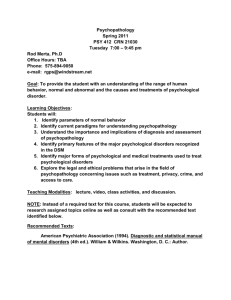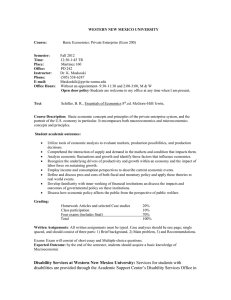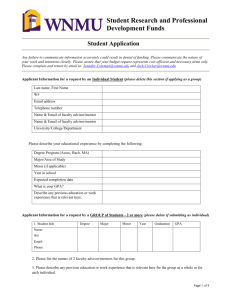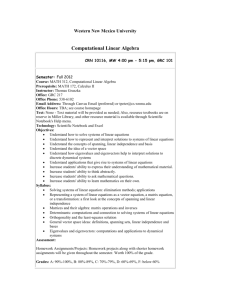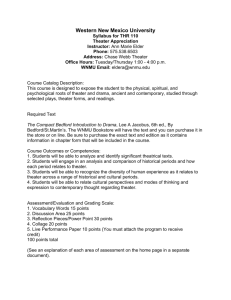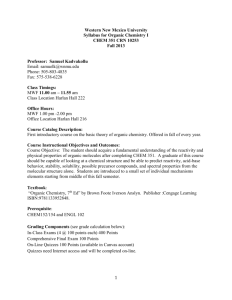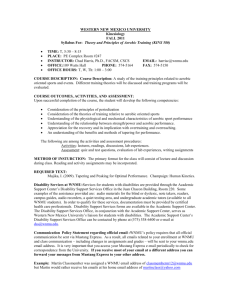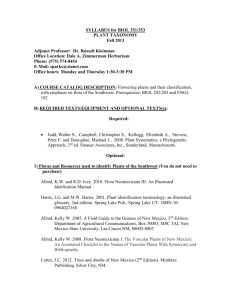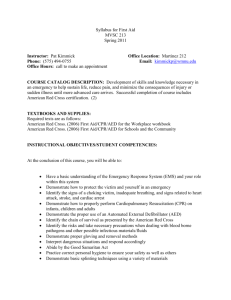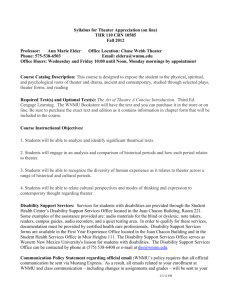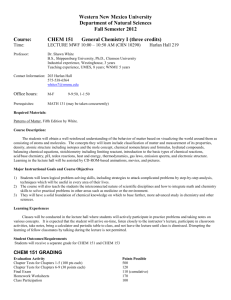CHEM 353 CRN 11062 - Western New Mexico University
advertisement
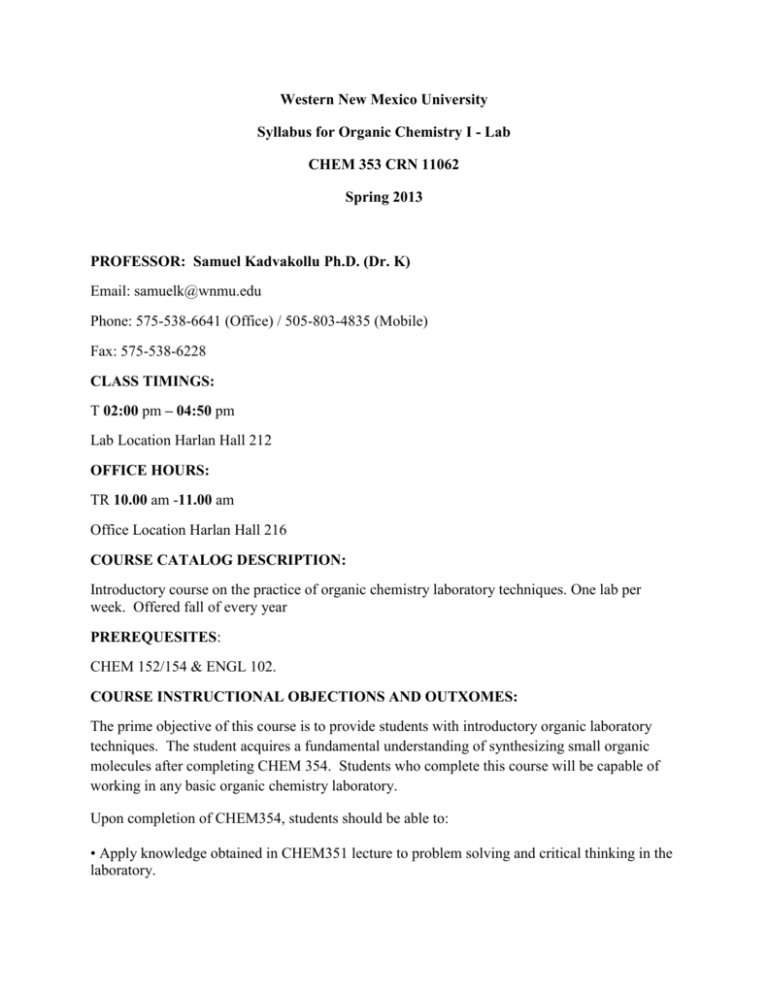
Western New Mexico University Syllabus for Organic Chemistry I - Lab CHEM 353 CRN 11062 Spring 2013 PROFESSOR: Samuel Kadvakollu Ph.D. (Dr. K) Email: samuelk@wnmu.edu Phone: 575-538-6641 (Office) / 505-803-4835 (Mobile) Fax: 575-538-6228 CLASS TIMINGS: T 02:00 pm – 04:50 pm Lab Location Harlan Hall 212 OFFICE HOURS: TR 10.00 am -11.00 am Office Location Harlan Hall 216 COURSE CATALOG DESCRIPTION: Introductory course on the practice of organic chemistry laboratory techniques. One lab per week. Offered fall of every year PREREQUESITES: CHEM 152/154 & ENGL 102. COURSE INSTRUCTIONAL OBJECTIONS AND OUTXOMES: The prime objective of this course is to provide students with introductory organic laboratory techniques. The student acquires a fundamental understanding of synthesizing small organic molecules after completing CHEM 354. Students who complete this course will be capable of working in any basic organic chemistry laboratory. Upon completion of CHEM354, students should be able to: • Apply knowledge obtained in CHEM351 lecture to problem solving and critical thinking in the laboratory. • Engage in safe laboratory practices by handling laboratory glassware, equipment, and chemical reagents appropriately, using general guidelines and basic knowledge about the common hazards associated with them in an organic chemistry laboratory. • Maintain an appropriate scientific notebook with correct notation, MSDS information on relevant chemical reagents, experimental procedures followed, data collected, and observations made during the experimental process. • Assemble glassware and perform the following techniques as a part of synthetic procedures: aqueous workup, distillation, reflux, separation, isolation, and crystallization. • Predict the outcome of several common organic reaction types through a basic understanding of starting materials, functional groups, mechanism, and typical reaction conditions. • Develop the skill set necessary to continue on to other upper level chemistry labs. TEXTBOOK: Title: Intro to Organic Lab Tech: Micro Appr, Author: Pavia 4th Edition. Publisher: Cengage Learning and ISBN: 9780495016304 Note: You do not have buy the text book. We will provide free text book for the students in this course. GRADING COMPONENTS Pre-lab 10% Observations 10% Lab report 50% Final Exam 20% Attendance 10% ATTENDANCE: Attendance is mandatory for this class. Students who miss more than one lab without notice will receive F grade in this class. LAB SYLLABUS: (lab section # form the Donald L Pavia Organic Laboratory Techniques) Experiment 1 Introduction to organic lab 354 & Micro scale Laboratory (1) Experiment 2 Extraction of Caffeine (4A) Experiment 3 Thin-Layer Chromatography (TLC) and Monitoring a reaction with Thin-Layer Chromatography (5B&5C) Experiment 4 Purification of organic compounds by using column chromatography (5C & 5D) Experiment 5 Aspirin (8) Experiment 6 Identification of Unknowns – Tests for Unsaturation (54C) Experiment 7 Identification of Alcohols (54H) Experiment 8 Synthesis of n-Butyl Bromide (23A) Experiment 9 Synthesis of t-Pentyl Chloride (23D) Experiment 10 Dehydrobromination of 1-Bromobutane and 2-Bromobutane (24B) Experiment 11 Methyl Stearate from Methyl Oleate (29) Experiment 12 Phase-transfer catalysis: Addition of Dichlorocarbene to cyclohexene (26) Experiment 13 (Last day of lab) Final Exam on 11/20/2013 & Apparatus checkout MAKE-UP EXAM POLICY: Students will only be allowed to take a make-up exam by arranging it prior to the date of the exam (i.e. you must talk to me outside of class and get your name on the makeup exam list) or when they have a note from their doctor or accepted university excuse. Disability Support Services: Services for students with disabilities are provided through the Student Health Center’s Disability Support Services Office located in the Juan Chacon Building, Room 221. Some examples of the assistance provided are audio materials for the blind or dyslexic, note takers, readers, campus guides, audio recorders, and a quiet testing area. In order to qualify for these services, certified health care professionals must provide documentation. Disability Support Services forms are available in the First Year Experience Office located in the Juan Chacon Building and in the Student Health Services Office in Muir Heights 111. The Disability Support Services Office serves as Western New Mexico University's liaison for students with disabilities. The Disability Support Services Office can be contacted by phone at (575) 5386400 or e-mail at matter@wnmu.edu. Communication Policy Statement Regarding Official E-mail: WNMU’s policy requires that all official communication be sent via Mustang Express. As a result, all emails related to your enrollment at WNMU and class communication – including changes in assignments and grades – will be sent to your wnmu.edu email address. It is very important that you access your Mustang Express e-mail periodically to check for correspondence from the University. If you receive most of your email at a different address, you can forward your messages from Mustang Express to your other address. Example: Martin Class member was assigned a WNMU email address of classmemberm12@wnmu.edu but Martin would rather receive his emails at his home email address of martinclass@yahoo.com Martin would follow the direction provided at http://www.wnmu.edu/campusdocs/direction%20for%20forwarding%20email.htm WNMU Policy on Email Passwords: WNMU requires that passwords for access to all of the protected software, programs, and applications will be robust, including complexity in the number of characters required, the combination of characters required, and the frequency in which passwords are required to be changed. Minimum complexity shall include: Passwords shall contain at least six (6) characters. Passwords shall contain at least one capital (upper case) letter, and at least one symbol (numbers and characters such as @ # $ % & *). Passwords shall be changed at least every 90 days. Academic Integrity Policy and Procedures: Each student shall observe standards of honesty and integrity in academic work as defined in the WNMU catalog. Violations of academic integrity include “any behavior that misrepresents or falsifies a student’s knowledge, skills or ability with the goal of unjustified or illegitimate evaluation or gain” (WNMU Faculty Handbook, 2008). Generally violations of the academic integrity include cheating and plagiarism. Refer to the catalog pages 60-61 for definitions. Penalties for infractions of academic integrity in this class are as follows: Plagiarism: “the intentional or unintentional representation of another’s work as one’s own without proper acknowledgement of the original author or creator of the work” (WNMU Faculty Handbook, 2008). Penalties: Students will receive a grade of zero on the assignment. Cheating: “using or attempting to use unauthorized materials…and unauthorized collaboration with others, copying the work of another or any action that presents the work of others to misrepresent the student’s knowledge” (WNMU Faculty Handbook, 2008). Any evidence of cheating will result in a grade of “F” for the course. Inclement Weather policy: Refer to the OTA Student Handbook for notification procedures. In the event that classes are closed during the scheduled final exam for this class provisions for students whose exams are canceled for scheduling a make-up exam or alternative arrangements will be made. “Transforming the Future Together”
